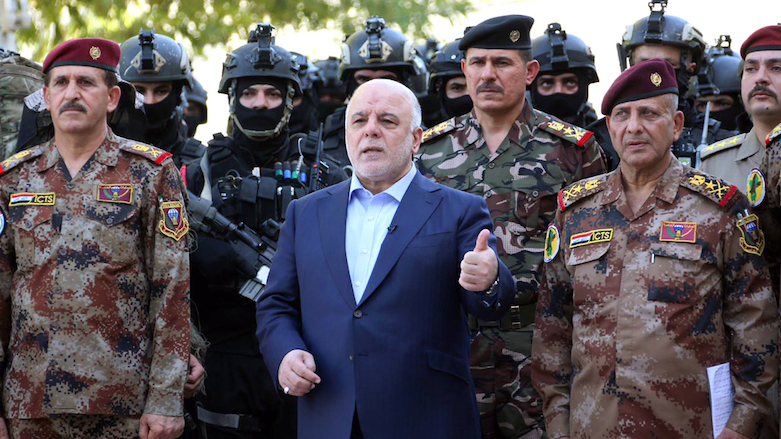Media Enquiries
For media inquiries contact:
+1 202 429 9500

Abadi: We’ll bring Kurds to heel, as US shifts (slowly) in pro-Kurdish direction
November 1, 2017
 Iraqi Prime Minister Haider al-Abadi (C) posing for a picture with army generals and members of the counter-terrorism forces in the capital Baghdad, July 9, 2016. (Photo: AFP)
Iraqi Prime Minister Haider al-Abadi (C) posing for a picture with army generals and members of the counter-terrorism forces in the capital Baghdad, July 9, 2016. (Photo: AFP)
WASHINGTON DC, United States (Kurdistan 24) – Iraqi Prime Minister Haider al-Abadi affirmed his intent to undertake two dramatic measures that would drastically weaken the Kurdistan Region.
Abadi said that he “wants the Peshmerga to become part of the Iraqi government security forces or a small local force,” The Independent’s Patrick Cockburn reported on Monday.
Abadi also told Cockburn, “All border crossings in and out of Iraq must be under the exclusive control of the federal state.”
That would include, according to Cockburn, the Kurdish oil pipeline to Turkey at Faysh Khabour and the border crossing to Turkey, where customs collection has been a major source of income since 1991 when the Kurdistan Regional Government (KRG) was established in the wake of the Gulf War.
However, Abadi appears to have spoken in disregard of Iraqi law.
Under the 2005 constitution—Article 114—customs are a function shared among the federal, regional, and provincial governments. Article 115 and 121 make such revenues subject to Kurdistan’s legal supremacy.
Abadi’s plans for the Peshmerga are equally dubious. The Peshmerga played a crucial role in resisting the Islamic State (IS), after the Iraqi Army—six divisions—collapsed in 2014.
Lt. Gen. Stephen Townsend, commander of coalition forces in Iraq, hailed the Peshmerga at an Aug. 31 press briefing, shortly before his tour of duty ended.
“The Peshmerga were instrumental in stopping the onslaught of [IS] in 2014 and 2015,” Townsend told reporters.
“Across much of northern Iraq, it was the Kurdish Peshmerga who held the line,” he said.
Indeed, Rep. Trent Franks (R, Arizona) has introduced legislation that describes the Peshmerga as “America’s most effective partner” in fighting IS and notes that nearly 2,000 Kurdish fighters have died in that conflict.
As Abadi shifts to an ever more heavy-handed, imperious stance toward the Kurds, the State Department—which has the lead on Iraq in US policymaking—has shifted, somewhat, in the opposite direction.
Kurds, and their friends, were dismayed at the US silence, as Iraqi forces, in combination with Iranian-backed militias, using US military equipment, including Abrams tanks, attacked the much more lightly-armed Peshmerga in Kirkuk and elsewhere.
Yet, a few positive points are emerging in the US position. The question is whether the change is occurring fast enough and whether the US is applying sufficient pressure on Abadi and his government.
On Monday, the State Department issued a statement welcoming Kurdistan Region President Masoud Barzani’s decision not to seek another term, as it hailed him as “a historic figure and courageous leader,” and reiterated an earlier call for negotiations between Baghdad and Erbil.
A third party is essential for any productive negotiations. It could be the US, the UN, or an interested party, like France. But, without a mediator, such talks would be “absurd,” as one experienced observer put it.
The US has also said Iraq’s seizure of the disputed territories “in no way changes their status—they remain disputed until their status is resolved in accordance with the Iraqi Constitution,” as the State Department affirmed on Oct. 20.
Monday’s State Department statement added, “A strong (KRG] within a unified and federal Iraq is essential to its long-term stability.”
The call for a “strong” KRG echoed language used by National Security Adviser Lt. Gen. H.R. McMaster 11 days before, when he spoke at the Foundation for the Defense of Democracies (FDD).
“Part of a strong Iraq is a strong Kurdistan Region,” McMaster said. He later explained that Iran had “played a role” in the attack on Kirkuk. It had schemed to divide the Kurdish parties, and used “those divisions to assert [its] own interests.”
Thus, a strong, united KRG would be a counter to Iran, as Iran seeks to divide the Kurds and bring them under its sway.
John Hannah, National Security Adviser to Vice-President Dick Cheney, and now senior counselor at the FDD, spoke similarly to Kurdistan 24.
“Unfortunately, [recent events] have left the KRG weaker than at any point since 2003,” Hannah stated.
“Arguably, the greatest success of the entire US project in Iraq—the establishment of a vibrant, pro-American [KRG]—now teeters perilously close to the edge of outright collapse,” he said.
The Kurdistan referendum was “ill-timed,” in Hannah’s view, but it is also a thing of the past.
“There exists a widespread perception across the Middle East,” Hannah cautioned, that “America opted to stand on the sidelines and watch as one of its most loyal wartime allies was cowed into submission by forces beholden to [Quds Force commander] Qassem Soleimani and the IRGC [Islamic Revolutionary Guard Corps].”
Hannah suggested that “moving forward,” the administration would be wise to “take a much more active stance in working for an immediate end to hostilities, concrete steps at de-escalation, and the commencement of negotiations to force a basis for constructive, long-term relations between a re-strengthened KRG and a sovereign, independent Iraqi government.”
One can only hope that senior US figures see that as well.
